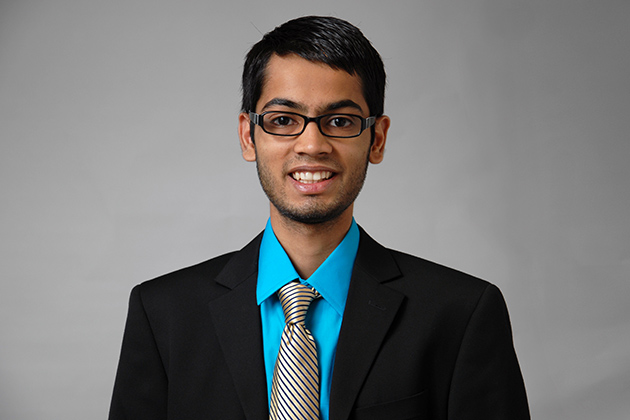This article is part of a series featuring some of this year’s outstanding graduating students, nominated by their academic school or college or another University program in which they participated. Check for additional profiles of students in the Class of 2013 on UConn Today from now through Commencement.

When Honors student Jigish Patel, a senior majoring in chemistry, political science, and history, moved from India to the U.S. in 2003, he found it difficult to participate in after-school activities.
“I could not speak English very well and I couldn’t always get a ride from my parents,” says Patel. “My dad was working two jobs and my mom was working a night job.”
So when he enrolled at UConn’s Greater Hartford campus, he wanted to take advantage of the many student organizations on campus.
“I wanted to get involved in student government because you can meet a lot of different people,” says Patel. “I also wanted to learn how the campus worked and how I could help out.”
In his junior year, Patel transferred to Storrs and immediately decided to continue working in Undergraduate Student Government. That same year, he ran for the position of vice president because he enjoys mediating internal affairs.
“Sometimes USG can be a really tense environment, and making it less tense was something I wanted to take on,” says Patel. “It was naturally the best role for me.”
His interests in politics and his childhood experiences in India inspired Patel to focus his senior thesis on the positive and negative effects of technology on farmers.
“I lived in a small village that was predominately farmers,” says Patel. “I remember when the first tractors were introduced to my town and the powerful impact it made.”
Specifically, Patel researched the effects of genetically modified foods (GMO) on farmers. He says that although countries have regulated GMOs to protect the environment, very little has been done to protect farmers harvesting the crop.
“The way the current system works usually favors environmental activists and large agribusinesses,” Patel says, “but not much has been done to help the farmers on the ground actually using the seeds that have been genetically modified.”
In hopes of extending his research, this semester Patel applied to the highly competitive Fulbright U.S. Scholarship Program. Out of more than 700 applicants, he was among the finalists.
“I wanted to continue learning and writing about this topic in an environment where GMOs are handled much differently,” says Patel. “In the United States, most of our food is genetically modified, but in the United Kingdom they are very much against GMOs.”
Instead, he will start a two-year teaching commitment in Strong, Ark., after graduation as a participant in the Teach for America program. In Strong, he will teach a wide range of math classes, from 7th grade math to AP Calculus. Patel says he applied to Teach for America because of the support he received from his teachers when he first moved to America from India.
“The group of people who really helped me adjust to a society with completely different cultural values and societal norms were my teachers,” Patel says. “That inspired me to want to help other people.”
After serving as vice president in USG, being a leader in a classroom setting is a role Patel is eager to pursue. He adds that if, by the end of the program he has developed passion for teaching, he will go on to become a full-time teacher.
“I think all students need a role model in their life,” he says, “and I want to be that person.”



